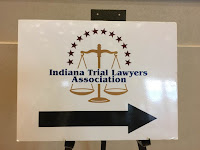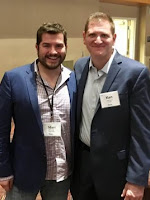 The Annual Institute is not only the Indiana Trial Lawyers Association’s “most popular event” — it also “provides two days of exceptional continuing legal education.” Attorneys Marc Lopez and Matthew Kroes — ever on the lookout for professional opportunities — managed to carve time out of their busy schedules for a shot at bettering themselves. Returning for the 52nd year, the Institute kicked off on Thursday morning, covering topics ranging from opening statements at trial to legal ethics.
The Annual Institute is not only the Indiana Trial Lawyers Association’s “most popular event” — it also “provides two days of exceptional continuing legal education.” Attorneys Marc Lopez and Matthew Kroes — ever on the lookout for professional opportunities — managed to carve time out of their busy schedules for a shot at bettering themselves. Returning for the 52nd year, the Institute kicked off on Thursday morning, covering topics ranging from opening statements at trial to legal ethics.
The Institute began with Arkansas Attorney Paul Ford‘s presentation on opening statements and what lawyers can do to improve them. As lawyers, we’re supposed to stick to the facts. At trial, we’re actually forbidden from referring to the Golden Rule (“Do unto others as you would have them do unto you”) in order to appeal to the jury’s humanity. We’re not allowed to explicitly ask the jurors to step into the plaintiff’s shoes and identify with the victim. Attorney Ford challenged those in attendance to use more indirect means to compel jurors to consider circumstances from the plaintiff’s perspective.
Next up was West Virginia Attorney Jim Lees, whose voice is equal parts Morgan Freeman and James Earl Jones. Attorney Lees spoke about persuasion techniques, forcing his audience to examine why civil litigators enjoy such a poor reputation with the general public. According to his theory, it’s a matter of hardwired human morality, which holds that compensation is earned through hard work. The cultural prejudice against personal injury attorneys is rooted in the perception that no one is actually working for the money that’s being awarded. Attorney Lees encouraged everyone to understand this instinctual bias, which is the first step in reframing the issue for the jury as one of damage and reimbursement. His presentation was psychologically-oriented and refreshingly free of legal jargon.
Attorney Ken Levinson, out of Chicago, Illinois, followed up with a talk about the benefits of using focus groups to help determine the strengths and weaknesses of a particular case. Being prepared and presenting the entire case to a focus group — even early on in litigation — can help a lawyer to recognize blind spots and view the facts from a fresh angle. Attorney Levinson used a focus group to help him obtain a $6.25 million reward in a wrongful death action.
After an update on legal ethics in Indiana, the day concluded with fascinating presentations on case management and subrogation lien resolution. With all of this practical information to digest, Attorneys Matthew Kroes and Marc Lopez need to rest up for Day 2 of the Indiana Trial Lawyers Association’s 52nd Annual Institute.




